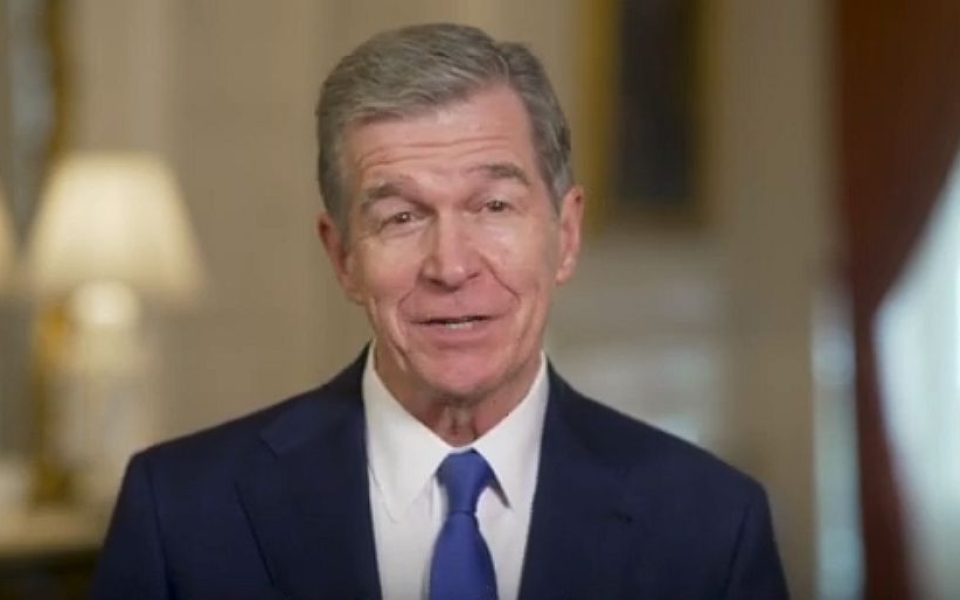Featured photo: Governor Roy Cooper announced Thursday he will veto SB 747. (Photo: Screengrab Gov. Cooper YouTube channel)
This story was originally published by NC Newsline, story by Lynn Bonner
Gov. Roy Cooper will veto a sweeping elections bill that would limit ballot-counting and allow partisan election observers to walk freely within polling places.
“This legislation has nothing to do with election security and everything to do with Republicans keeping and gaining power,” said Cooper. “It requires valid votes to be tossed out unnecessarily, schemes to restrict early voting and absentee ballots, encourages voter intimidation and attempts to give Republican legislators the authority to decide contested election results.”
In a release issued Thursday morning by his press office, the governor called Senate Bill 747 a ‘dangerous’ election bill that makes it harder for younger voters, college students away from home and people of color to vote and have their votes to count.
News of Cooper’s veto was praised by voting rights advocates.
“Senate Bill 747 is filled with a number of bad ideas that would undermine North Carolinians’ freedom to vote,” said Bob Phillips, Executive Director of Common Cause North Carolina. “We applaud Governor Cooper for vetoing this unnecessary and damaging bill. We call on the legislature to uphold this veto and stop attacking our voting rights.”
The Republican-led legislature is however likely to override his veto. The legislature passed the bill along party lines on Aug. 16.
Senate Bill 747 is a grab-bag of Republican election law changes. They’ve been arguing for some of the provisions for years. Other elements are newer and pushed by a group that is fueled by distrust of elections and election results.
Cooper, a Democrat, had previously rejected some of the provisions when they were the subject of stand-alone bills.
In 2021, for example, Cooper rejected a bill that allows mail-in ballots postmarked by election day to count if they arrive within three days after election day.
Also in 2021, he vetoed a ban on using private grant money to help run elections. In 2019, Cooper vetoed a bill that would have required the state Board of Elections to remove people from voting rolls those people who said they could not serve on juries because they were not citizens.
The Republican-led legislature could not get those bills passed Cooper’s veto in previous sessions. The GOP now holds veto-proof majorities in the House and Senate and has enough votes to make those changes law.
Adding to Republicans’ elections to-do list, the NC Election Integrity Team won provisions that allow partisan observers to walk around polling places, as long as they don’t obstruct poll workers or voters, or try to look at or photograph marked ballots. Observers would be able to listen to conversations between voters and elections officials and take notes using electronic devices inside polling places.
The NC Election Integrity Team trains poll observers to hunt for supposed voter fraud. The group is connected to Cleta Mitchell’s Election Integrity Network. Mitchell is a lawyer who tried to help former President Donald Trump reverse his Georgia loss in the 2020 election. She was not indicted in the RICO case.
In a 4 1/2 -page letter urging Cooper to veto the bill, 27 organizations including the ACLU of North Carolina, Common Cause North Carolina, NC Voters for Clean Elections, and the NAACP North Carolina, said allowing partisan observers to listen to voters’ conversations with poll workers “crosses the line into an opportunity for voter intimidation and suppression, reminiscent of Reconstruction-era tactics by the Ku Klux Klan.”
The provisions prioritizing poll watcher activities could make polling places vulnerable to disruption, they wrote.
The organizations objected to other controversial sections of the bill, including the requirement for 10 counties to test signature-verification on mail-in ballots during next year’s primary.
Signature verification amounts to overkill in a state where mail-in ballots already require two witness signatures or a notary signature, the groups’ letter said. Voters who cast mail-in ballots will also be asked to include a copy of their photo ID with their ballot.
Signature verification systems are more likely to reject signatures from Black voters, older voters, Latino voters, voters with disabilities, and first-time mail-in voters, the letter said.
Overall, the bill’s “changes impose new barriers on older adult voters, college students, disabled voters, rural voters, and those who vote by mail, and reinforcing discrimination against communities of color across the state” they wrote.
Gov. Cooper also vowed on Thursday to veto Senate Bill 749, should that make it to his desk.
SB 749 would change the structure of the State and County Boards of Elections in what the governor called “a backdoor maneuver” to limit early voting and satisfy the Republican legislature’s quest for more power to decide contested elections.
NC Newsline producer Clayton Henkel contributed to this report.
NC Newsline is part of States Newsroom, a nonprofit news network supported by grants and a coalition of donors as a 501c(3) public charity. NC Newsline maintains editorial independence. Contact Editor Rob Schofield for questions: [email protected]. Follow NC Newsline on Facebook and Twitter.
Join the First Amendment Society, a membership that goes directly to funding TCB‘s newsroom.
We believe that reporting can save the world.
The TCB First Amendment Society recognizes the vital role of a free, unfettered press with a bundling of local experiences designed to build community, and unique engagements with our newsroom that will help you understand, and shape, local journalism’s critical role in uplifting the people in our cities.
All revenue goes directly into the newsroom as reporters’ salaries and freelance commissions.


Leave a Reply